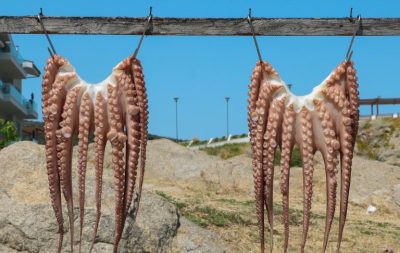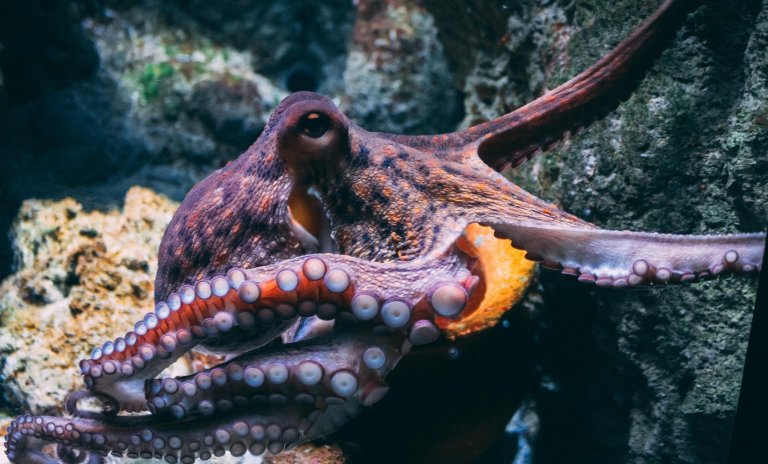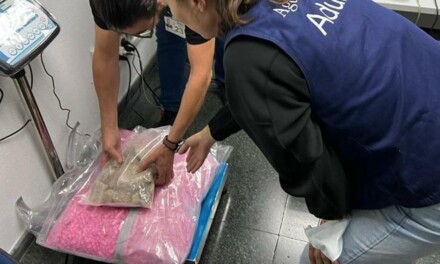The Spanish multinational fishing company, Nueva Pescanova, has been planning to launch the world’s first commercial octopus farm in Gran Canaria’s port of Las Palmas. Expected to produce about 3,000 tonnes of octopus meat annually, the proposed facility is attracting widespread attention and criticism. Much of the scientific community, as well as animal activists, have expressed opposition to the controversial plans.
Nueva Pescanova is already experimenting with octopus breeding at a research facility in northern Spain. If the application is approved by the end of 2023, construction will commence, with an expected two-year timeline. The project is estimated to cost around €65 million. The first octopuses from the farm could reach the market by 2027.
Experts, activists and scientists have all warned about the severe ethical implications of the planned farm, which has made headlines across the world. Dr. Elena Lara, Fish Research Manager at Compassion In World Farming, has stated that octopuses are complex and intelligent creatures that will experience “intense suffering” under the proposed farming conditions. The animals will be housed in crowded tanks, predicting a mortality rate of 10-15%.
The project could also have an adverse effect on the environment. Dr. Lara indicated that octopus farming will rely heavily on unsustainable fishmeal and fish oil for feeding the animals, which are themselves carnivorous, posing “high environmental risks.”
 The proposed commercial octopus farm will now be subject to an ordinary and full environmental assessment process, according to an announcement by the Canary Islands Government. This move is significant because it implies the project could have “significant environmental effects,” necessitating the need for more in-depth analysis than was previously expected.
The proposed commercial octopus farm will now be subject to an ordinary and full environmental assessment process, according to an announcement by the Canary Islands Government. This move is significant because it implies the project could have “significant environmental effects,” necessitating the need for more in-depth analysis than was previously expected.
The project had initially undergone a simplified environmental assessment. However, it’s been shifted to a more comprehensive process, signifying that the authorities see potential for significant environmental impacts that require further investigation.
Nueva Pescanova has yet to submit essential documents needed for the new review process, according to sources within the Regional Ministry of Ecological Transition and Energy. The required documents include the project’s framework, an environmental impact study, and the results of having put the plan to a public consultation, published on July 2, 2021.
The project has attracted attention from approximately 30 progressive Members of the European Parliament who have warned of the farm’s “dangers,” which they claim extend beyond environmental impact to include potential harm to human health.
In May 2022, around 100 environmental groups called for “more detailed” information about the project’s water filtration methods and possible impacts on air quality. Concerns have also been raised about the risk of unknown pathogens affecting the marine ecosystem. Although the Canary Islands Government initially saw no reason to deny the project, newer details have reignited controversy, prompting the European Parliament to weigh in.
The ordinary environmental assessment is set to last four months, extendable by two more if there are justifiable reasons. This contrasts with the three months typically allocated for simplified assessments. Nueva Pescanova aims to develop the farm over a 50,000 square-meter area in the Port of Las Palmas and produce around 3,000 tons of octopus annually, which would account for nearly 10% of Spain’s total production. The project is set to cost approximately €65 million and will feature about 1,000 communal tanks to house between 10 and 15 individuals per cubic meter, according to the organization Eurogroup for Animals. Many experts and activists believe that this sort of cramped collective environment will likely lead to cannibalism and disease.
Scientific Research Underway
Scientists from the University Institute for Research in Sustainable Aquaculture and Marine Ecosystems (IU-ECOAQUA), affiliated with the University of Las Palmas de Gran Canaria, are studying octopus pain receptors to develop ethical guidelines for their sacrifice, given the current lack of legal framework for such practices in aquaculture, for a few months now they have been studying the “anatomical locations of pain nuclei ” of the octopus to develop a code of good practices for slaughter, since at this time there is no regulatory framework for this in aquaculture.
Public Protests Continue
Public opposition to the octopus farm has been ongoing, with the latest protest drawing about 50 participants. Groups involved include well-known environmental organisations such as AnimaNaturalis and Greenpeace, as well as political parties like PACMA and Podemos.
The project’s future remains uncertain as it faces both regulatory and public scrutiny. With the environmental assessment process now elevated, stakeholders await further developments, while the developers are finding that increased attention may well further slow their initial projected timelines to start the project.
Challenges and Concerns Surrounding Octopus Farming
Octopus farming, a relatively new venture in aquaculture, has sparked debate among scientists, environmentalists, and animal welfare advocates. Below are some of the primary issues associated with the practice:
Ethical Considerations
- Animal Welfare: Octopuses are highly intelligent creatures, capable of problem-solving and exhibiting complex behaviors. Their ability to feel pain and distress makes the ethics of their confinement and handling a point of real concern.
Environmental Impacts
- Water Pollution: Farms generate large amounts of waste, including feces and uneaten food, that can contaminate the surrounding water.
- Ecosystem Imbalance: Farmed octopuses could potentially escape into the wild, disrupting local ecosystems, they are known for their ingenuity and ability to break out of even the most secure of settings.
- Resource Intensity: Octopuses are carnivorous, requiring a significant amount of fish to sustain them, which can further deplete already strained fish populations.
Health Concerns
- Pathogen Transmission: Farming octopuses in confined conditions increases the risk of disease transmission, both among octopuses and potentially to other marine life.
- Chemical Use: The use of antibiotics or other chemicals to control disease could have broader environmental impacts and raise concerns about human health.
Economic and Operational Issues
- High Mortality Rates: Octopuses have complex lifecycle requirements, and farming can result in high juvenile mortality rates.
- Feed Costs: As predators, octopuses require a diet of other marine animals like fish and crustaceans, making their farming costly in terms of feed.
Regulatory Gaps
- Lack of Guidelines: There are currently no comprehensive welfare standards for octopus farming, making regulation and oversight challenging.
- Sustainability Concerns: Without proper guidelines, achieving a sustainable octopus farming model becomes difficult.
Public Perception and Social Issues
- Local Opposition: As has been seen in Las Palmas de Gran Canaria, proposed octopus farms face significant public scrutiny and opposition due to environmental, ethical, or health concerns.
- Cultural Factors: Octopuses hold different cultural significance in different regions, which can influence public opinion about their farming.
While octopus farming presents an opportunity to meet growing culinary demand, these concerns underline the need for careful planning, ethical considerations, and rigorous environmental assessment before such ventures can be considered sustainable and ethical.
Ethical and Social Implications
Some argue that the controversy around octopus farming exposes speciesism, as the public’s reaction to the plans is different from the generally accepted farming of other animals. A Washington Bill has recently been introduced, aiming to ban octopus farming in the US state, while Compassion In World Farming is urging the UK to prohibit octopus imports from farms.
Why Now?
Despite these concerns, Nueva Pescanova is pushing forward, citing increasing global demand for octopus meat and claiming that the farm will alleviate pressure on overexploited wild octopus populations. However, experts refute this, stating that the farm would require large amounts of wild fish for feed, undermining its sustainability claims.
The plans for the octopus farm have ignited a debate on animal welfare, environmental sustainability, and ethics. While the company argues that the project meets growing global demand for octopus, critics insist that the negative implications far outweigh any purported benefits.
For local and international observers, the project sets a controversial precedent in the animal farming industry.













